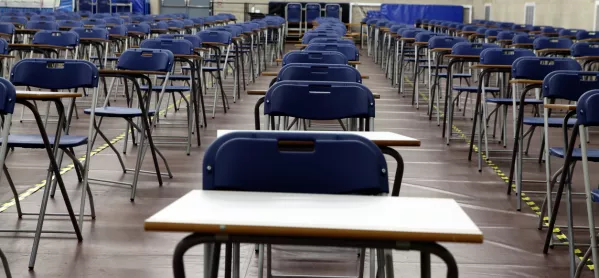- Home
- GCSE attainment gap ‘inevitable’ this year, say heads
GCSE attainment gap ‘inevitable’ this year, say heads

Teachers should not be expected to fix the “inevitable” attainment gaps between different groups of students in this year’s teacher-assessed grading system for GCSEs and A levels, heads have warned.
In a response to Ofqual’s consultation on the GCSE and A-level grading exam replacement process, which closed yesterday, the Association of School and College Leaders said individual rank orders submitted by schools to exam boards should not be modified to account for bias towards disadvantaged or black, Asian and minority ethnic (BAME) students, and that “we believe Ofqual should make clear to centres that gaps between groups, based on the task being undertaken, are inevitable”.
The union’s response comes after the Equality and Human Rights Commission said today that Ofqual should issue guidance on the “approach which teachers should take to predicting grades and ranking pupils in order to minimise the risk of conscious or unconscious bias”.
The EHRC said schools should be required to provide exam boards with data on students’ socioeconomic backgrounds and ethnic groups “to check for systematic advantages or disadvantages”, and that following the process, Ofqual should publish a report evaluating the grading process, with any disparities disadvantaging particular groups of students investigated and “appropriate remedial action” taken.
Coronavirus: Coping with GCSE cancellations
Geoff Barton, general secretary of the Association of School and College Leaders, said: “We will study the proposals of the Equality and Human Rights Commission with interest, and it is obviously important to guard against unconscious bias.
“But we do need to be careful not to layer on additional complexity to what is an already extremely complex process. The overriding principle of centre-assessed grades is that they must be an accurate and fair assessment of the student’s work, regardless of background.”
Yesterday, social mobility charity The Sutton Trust said student rankings should be adjusted to correct for bias against disadvantaged students.
Related: ‘Adjust GCSE school rankings to stop inequality’
News: Equalities watchdog warns Ofqual over GCSE grading bias
Williamson: ‘Shortened’ GCSEs in autumn a possibility
However, the ASCL said that headteachers should not be required to sign an Equalities Law declaration, stating that “this is a difficult issue, given that teachers are required to emulate a process which does lead to differences between groups”.
“For example, girls perform considerably better than boys in English language GCSE,” the response said.
“We have emphasised to ASCL members that, whilst perpetuating existing gaps is deeply uncomfortable, this is neither the method or moment to attempt to narrow them, and they should focus on the task of assigning the most plausible grade.”
The ASCL also said that schools should be exempt from freedom of information requests from students after results are released.
The union also said that while schools were exempt from releasing any information pertaining to students’ grades until results were released, “we have great concerns about the potential for a large number of data subject access requests following that date and for the impact on teachers and school leaders as a result. We would continue to urge Ofqual to seek emergency exemption for this process from appropriate data legislation.”
It added that “there is a risk that disclosing rank may allow confidential information relating to other pupils to be deduced.”
The ASCL said it agreed that students in Year 10 and below who had been entered for exams this year should receive centre-assessed grades, but cautioned that there was a risk “the awarding process becomes less secure”, as “current Year 10 pupils are the oldest pupils to have scaled scores rather than older style national curriculum assessments with levels”.
The ASCL also said:
- Students, as individuals, should not be able to appeal their grades - only schools should carry out appeals.
- Ofqual needs to be “explicit” about how independent school students’ grades will be moderated, given that many students will lack key stage 2 data to model this on.
Mr Barton added: “In our consultation response, we have agreed with Ofqual that heads of centre should not need to make a specific declaration in relation to Equalities Law.
“As Ofqual points out, given the unusual circumstances, it would not be practical for a school or college to conduct an equalities impact assessment. Moreover, there is already an equalities safeguard in place given that the data will be drawn from normal teaching and learning, which was subject to policies and procedures guided by equalities legislation.
“We are conscious that this is a difficult issue, however, because there is a difference between how different groups of pupils perform in exams in a normal year, and centre-assessed grades emulate that process. This is deeply uncomfortable, because we are all trying to close these gaps. But our advice to members is to deal with the here and now, and concentrate on providing the most accurate grade, rather than attempting to narrow those gaps through this process.
“On data requests, schools and colleges are already exempt until results are published. Our concern is that they might then be subject to a large number of requests after that date and that will cause significant issues. Most significantly, if there are several requests regarding a relatively small subject cohort, it would be possible to work out the ranking order of all the candidates through a process of elimination. We feel this would be deeply unfair on the young people affected and we would, therefore, like to see an emergency exemption made in the appropriate legislation.”
Keep reading for just £1 per month
You've reached your limit of free articles this month. Subscribe for £1 per month for three months and get:
- Unlimited access to all Tes magazine content
- Exclusive subscriber-only stories
- Award-winning email newsletters